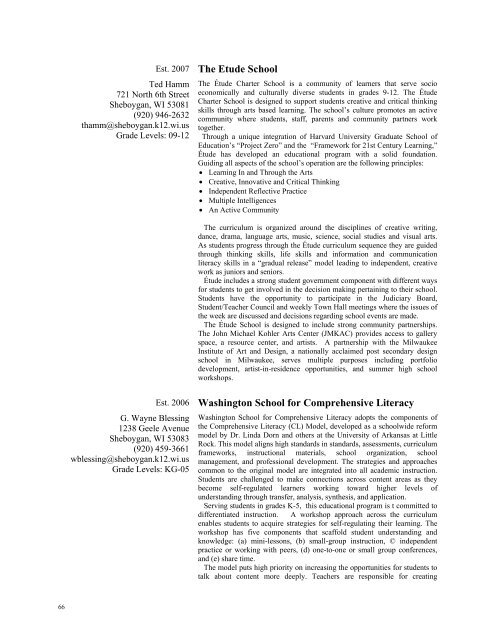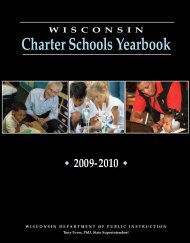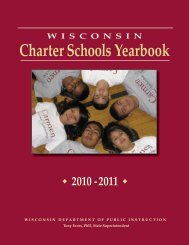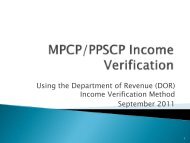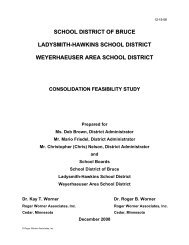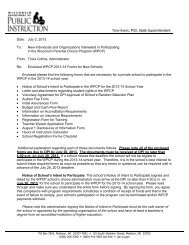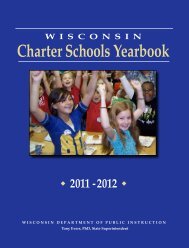Wisconsin Charter Schools Yearbook - School Management Services
Wisconsin Charter Schools Yearbook - School Management Services
Wisconsin Charter Schools Yearbook - School Management Services
Create successful ePaper yourself
Turn your PDF publications into a flip-book with our unique Google optimized e-Paper software.
66<br />
Ted Hamm<br />
721 North 6th Street<br />
Sheboygan, WI 53081<br />
(920) 946-2632<br />
thamm@sheboygan.k12.wi.us<br />
Grade Levels: 09-12<br />
G. Wayne Blessing<br />
1238 Geele Avenue<br />
Sheboygan, WI 53083<br />
(920) 459-3661<br />
wblessing@sheboygan.k12.wi.us<br />
Grade Levels: KG-05<br />
Est. 2007 The Etude <strong>School</strong><br />
The Étude <strong>Charter</strong> <strong>School</strong> is a community of learners that serve socio<br />
economically and culturally diverse students in grades 9-12. The Étude<br />
<strong>Charter</strong> <strong>School</strong> is designed to support students creative and critical thinking<br />
skills through arts based learning. The school’s culture promotes an active<br />
community where students, staff, parents and community partners work<br />
together.<br />
Through a unique integration of Harvard University Graduate <strong>School</strong> of<br />
Education’s “Project Zero” and the “Framework for 21st Century Learning,”<br />
Étude has developed an educational program with a solid foundation.<br />
Guiding all aspects of the school’s operation are the following principles:<br />
• Learning In and Through the Arts<br />
• Creative, Innovative and Critical Thinking<br />
• Independent Reflective Practice<br />
• Multiple Intelligences<br />
• An Active Community<br />
The curriculum is organized around the disciplines of creative writing,<br />
dance, drama, language arts, music, science, social studies and visual arts.<br />
As students progress through the Étude curriculum sequence they are guided<br />
through thinking skills, life skills and information and communication<br />
literacy skills in a “gradual release” model leading to independent, creative<br />
work as juniors and seniors.<br />
Étude includes a strong student government component with different ways<br />
for students to get involved in the decision making pertaining to their school.<br />
Students have the opportunity to participate in the Judiciary Board,<br />
Student/Teacher Council and weekly Town Hall meetings where the issues of<br />
the week are discussed and decisions regarding school events are made.<br />
The Étude <strong>School</strong> is designed to include strong community partnerships.<br />
The John Michael Kohler Arts Center (JMKAC) provides access to gallery<br />
space, a resource center, and artists. A partnership with the Milwaukee<br />
Institute of Art and Design, a nationally acclaimed post secondary design<br />
school in Milwaukee, serves multiple purposes including portfolio<br />
development, artist-in-residence opportunities, and summer high school<br />
workshops.<br />
Est. 2006 Washington <strong>School</strong> for Comprehensive Literacy<br />
Washington <strong>School</strong> for Comprehensive Literacy adopts the components of<br />
the Comprehensive Literacy (CL) Model, developed as a schoolwide reform<br />
model by Dr. Linda Dorn and others at the University of Arkansas at Little<br />
Rock. This model aligns high standards in standards, assessments, curriculum<br />
frameworks, instructional materials, school organization, school<br />
management, and professional development. The strategies and approaches<br />
common to the original model are integrated into all academic instruction.<br />
Students are challenged to make connections across content areas as they<br />
become self-regulated learners working toward higher levels of<br />
understanding through transfer, analysis, synthesis, and application.<br />
Serving students in grades K-5, this educational program is t committed to<br />
differentiated instruction. A workshop approach across the curriculum<br />
enables students to acquire strategies for self-regulating their learning. The<br />
workshop has five components that scaffold student understanding and<br />
knowledge: (a) mini-lessons, (b) small-group instruction, © independent<br />
practice or working with peers, (d) one-to-one or small group conferences,<br />
and (e) share time.<br />
The model puts high priority on increasing the opportunities for students to<br />
talk about content more deeply. Teachers are responsible for creating


